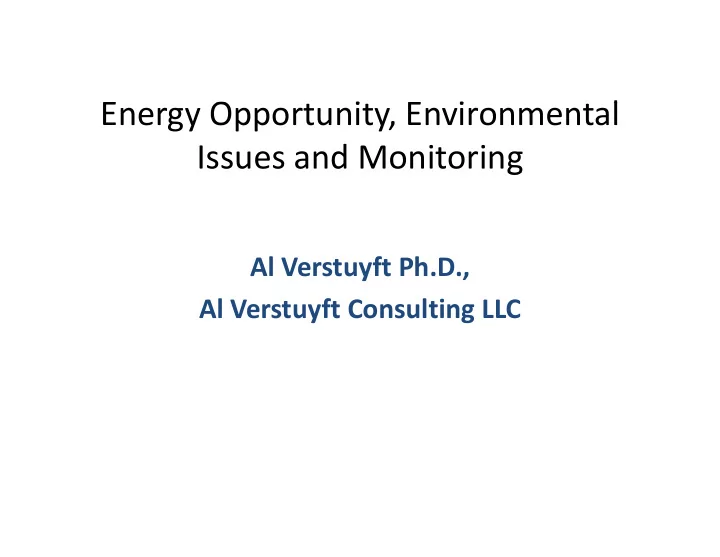

Energy Opportunity, Environmental E O i E i l Issues and Monitoring Al Verstuyft Ph.D., Al Verstuyft Consulting LLC Al Verstuyft Consulting LLC
Do Not Drink This Water! Do Not Drink This Water!
Shale Gas Shale Gas ‐ Introduction to the technology Introduction to the technology ‐ Horizontal Drilling ‐ Hydraulic Fracturing ‐ Environmental Issues ‐ Water Resources ‐ Chemical Exposures – Water, Air, Waste & Radioactivity ‐ S f t C lt Safety Culture ‐ Monitoring: Value of Measurement/Testing
“Gas Equivalent of Two Saudi Arabias!” Gas Equivalent of Two Saudi Arabias!
Rig Operation Rig Operation
Basic Well Structure Basic Well Structure
NATURALLY OCCURRING SUBSTANCES THAT MAY BE FOUND IN HYDROCARBON ‐ CONTAINING FORMATIONS Type of Contaminant Example(s) Brine a Formation fluid Natural gas b (e.g., methane, ethane), Gases Gases Natural gas (e.g., methane, ethane), carbon dioxide, hydrogen sulfide, nitrogen, helium Mercury, lead, arsenic c Mercury lead arsenic c Trace elements Trace elements Radium, thorium, uranium c Naturally occurring radioactive material Organic material Organic acids, polycyclic aromatic hydrocarbons, volatile and semi ‐ volatile organic compounds organic compounds
Chemical Used in Hydraulic Fracturing Chemical Used in Hydraulic Fracturing
AN EXAMPLE OF THE VOLUMETRIC COMPOSITION OF HYDRAULIC FRACTURING FLUID Component Example Compound(s) Purpose Percent Composition Volume Chemical (by Volume) (Gallons)a Water Deliver proppant 90 2,700,000 Proppant Silica, quartz sand Keep fractures open to allow gas flow out 9.51 285,300 Acid Hydrochloric acid Dissolve minerals, initiate cracks in the rock 0.123 3,690 Friction Friction Polyacrylamide Polyacrylamide, Minimize friction between fluid and the pipe Minimize friction between fluid and the pipe 0 088 0.088 2 640 2,640 reducer mineral oil Surfactant Isopropanol Increase the viscosity of the fluid 0.085 2,550 Potassium chloride Create a brine carrier fluid 0.06 1,800 Gelling agent Guar gum, Thickens the fluid to suspend the proppant 0.056 1,680 hydroxyethyl cellulose Scale inhibitor Ethylene glycol Prevent scale deposits in the pipe 0.043 1,290 pH agent Sodium or potassium Maintain the effectiveness of other components 0.011 330 carbonate Breaker B k Ammonium persulfate Allow delayed breakdown of the gel A i lf t All d l d b kd f th l 0 01 0.01 300 300 Crosslinker Borate salts Maintain fluid viscosity as temperature increases 0.007 210 Iron control Citric acid Prevent precipitation of metal oxides 0.004 120 Corrosion N,N ‐ dimethyl formamide Prevent pipe corrosion 0.002 60 inhibitor Biocide Glutaraldehyde Eliminate bacteria 0.001 30
Methane in Well Water Methane in Well Water
Methanogenesis vs Thermogenesis
Methanogenesis vs Thermogenesis
Comparison of Major Anions and Isotopes Comparison of Major Anions and Isotopes In Drinking-Water Wells
Monitoring i i Key Points Using analytical $ wisely to get right $ • balance of tests – type and frequency Designing a monitoring program to D i i it i t • anticipate emerging environmental regs! Ensuring any data passes scrutiny Ensuring any data passes scrutiny • Providing legally defense reports. •
Program Management Considerations • Consistent analytical methods and reporting Consistent analytical methods and reporting throughout the the complete cycle of well – Suitable for all matrices (frac fluid flowback – Suitable for all matrices (frac fluid, flowback water, produced water, GW, SW, DW) – Allows for direct comparison of results through Allows for direct comparison of results through out the life of the well – Maintain consistent reportling limit and DL Maintain consistent reportling limit and DL
Components of Quality Program • Quality Assurance Project Plan (QAPP) Quality Assurance Project Plan (QAPP) • Quality Control – specific compounds of analytical process that collectively ensures analytical process that collectively ensures test conformance to set standard limits • Matrix specific QC limits based on validation Matrix specific QC limits based on validation of QC elements (LCS, Blanks, MS/MSD, calibration verification, MDL verification) • Control limits for each QC item – report the 95% (2 sigma) outcome on client reports.
Takes Aways! Takes Aways! • Poor casing completion including cementing Poor casing completion including cementing can allow methane migration into water • No frac fluids in drinking water have been • No frac fluids in drinking water have been reported • Frac fluids, produced water and flow back F fl id d d d fl b k waters pose analytical challenges • Technically sound and legally defensible monitoring programs are needed
References and Acknowledgements http://water.epa.gov/type/groundwater/uic/class2/hydraulicfracturing/index.cfm Chemical Used in Hydraulic Fracturing 18411 http:/ / democrats.energycommerce.house.gov/ sites/ default/ files/ documents/ Hydraulic%20Fracturi ng%20Report%204.18.11.pdf Insiders Sound an Alarm Amid a Natural Gas Rush, I. Urbina, N.Y. Times 25 June 2011, http:/ / www.nytimes.com/ interactive/ us/ DRILLING_DOWN_SERIES.html The Fact About Fracking, Wall Street Journal 25 June 2011 Methane Contamination of Drinking Water Accompanying Gas-Well Drilling and Hydraulic h i i f i ki i ll illi d d li Fracturing, S.G. Osborn, et.al, Proceedings of the National Academy of Sciences, www.pnas.org/ cgi/ doi/ 10.1073/ pnas.1100682108 Research and Policy Recommendations for Hydraulic Fracturing and Shale-Gas Extraction, R.B. Research and Policy Recommendations for Hydraulic Fracturing and Shale Gas Extraction, R.B. Jackson, et.al., Center on Global Change, Duke University, Durham, N.C.; Jackson@duke.edu Methane Fouls Well Water, Chemical & Engineering News, 16 May 2011 htt http:/ / en.wikipedia.org/ wiki/ Hydraulic_fracturing / / iki di / iki/ H d li f t i http:/ / www.nytimes.com/ interactive/ 2011/ 02/ 27/ us/ fracking.html interactive 2/ 26/ 11 http:/ / www.nytimes.com/ interactive/ us/ natural-gas-drilling-down-documents- p / / y / / / g g 5.html#document/ p41/ a21596 Gasland NOW on PBS 26/ 3/ 2010, http:/ / www.pbs.org/ now/ shows/ 613/ index.htm l
Disclosure & Disclaimer Disclosure & Disclaimer The Views Expressed In this Presentation The Views Expressed In this Presentation DO NOT represent those of my former employer O O h f f l Chevron Corporation or the American Petroleum Institute for whom I consult.
Questions & Answers
Recommend
More recommend